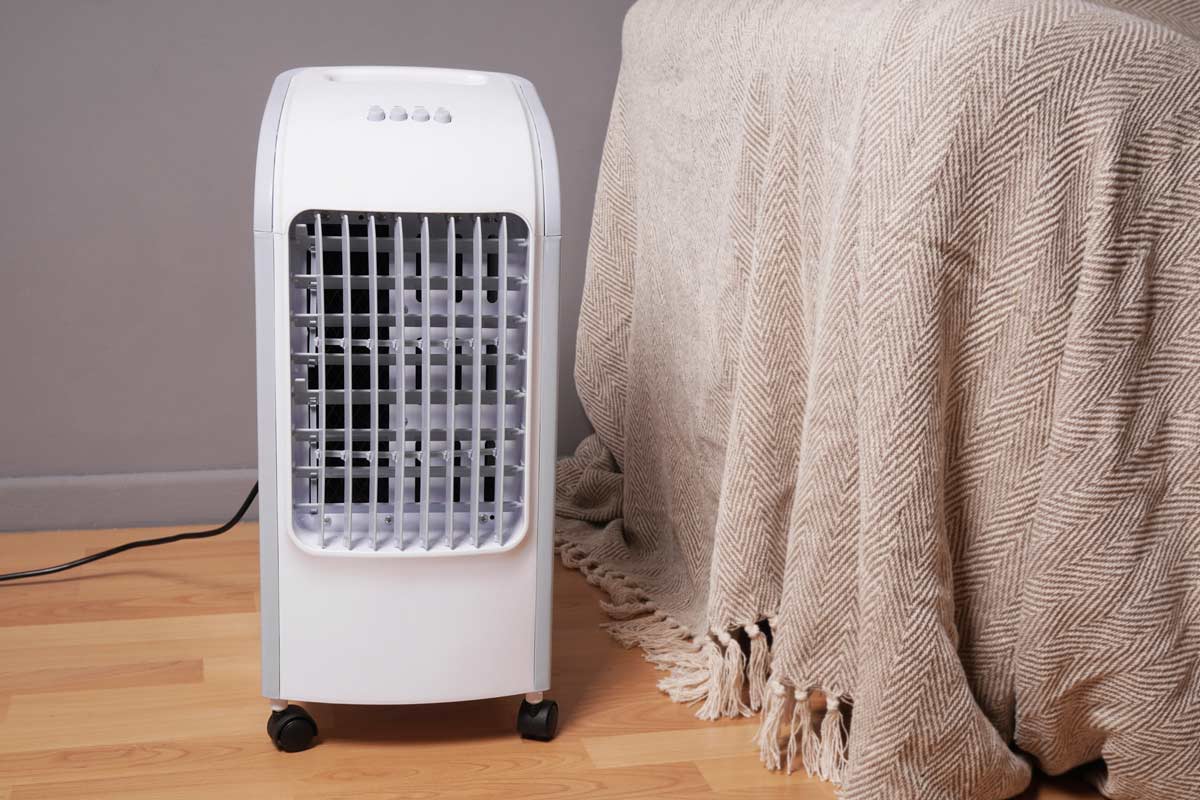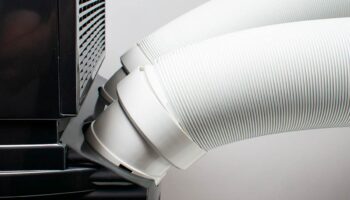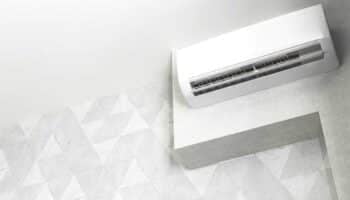We've independently reviewed this article to make sure it's as accurate as we can make it.
To find out more about our article creation and review process, check out our editorial guidelines.
If you’re confused about your portable air conditioner run time, it’s really not all that surprising. You can find information online telling you a) to turn it on first thing in the morning, b) turn it off before you go to bed, and c) to let it run 24/7.
That’s not very helpful, right?
I agree, and I’m here to provide some useful information!
The reality is the length of time you run your portable air conditioner depends on you and your preferences. If your budget is more important to you than your comfort — or vice versa — you’ll choose your run time accordingly. So you can run it all day or just part of the day, either is fine.
Keep reading, and I’ll provide you with enough information to back that statement up.
The Best Portable Air Conditioner Run Time
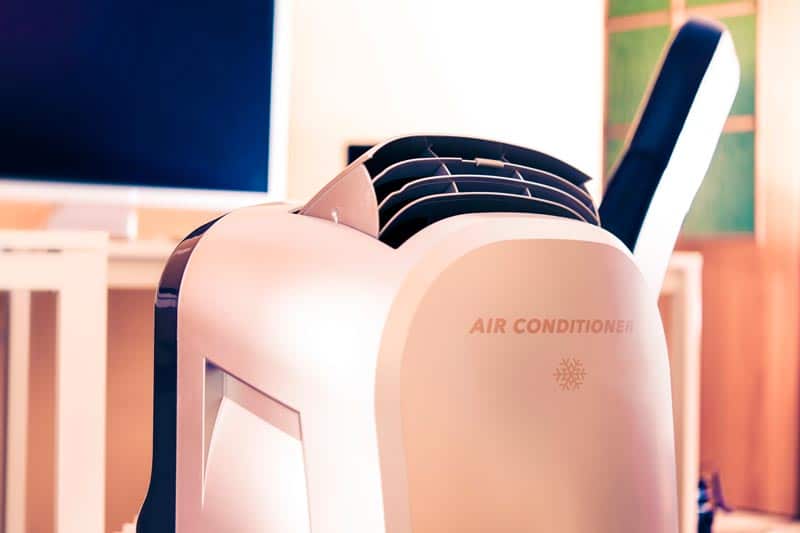
First of all, let’s clarify something.
This article isn’t addressing how long and how often your air conditioner should cycle. While they’re running, heating and air conditioning appliances cycle on and off. Assuming the equipment is working properly, the length of the cycle will depend on a variety of factors, including:
- The set temperature on your thermostat
- How extreme the outdoor temperatures are
On a typical summer day, your air conditioner should run for about 15 minutes before the compressor shuts off. And then in about another 10 or 15 minutes, it will cycle back on.
On extremely hot days, your air conditioner has to work harder, so the cycle may be a little bit longer.
Now, with that out of the way, let’s move on to the topic at hand—how many hours in a day should you run your portable air conditioner?
Portable Air Conditioner Life Expectancy
Your portable air conditioner should have a lifespan of about 5 to 10 years. Unfortunately, they have the shortest lifespan of any type of AC.
| Type of AC | Lifespan |
|---|---|
| Portable | 5 to 10 years |
| Window | 10 to 20 years |
| Mini split | 15 to 20 years |
| Central | 20 to 25 years |
There are a few reasons for the shorter lifespan of a portable air conditioner. The most important, in my opinion, at least, is that the compressor in a portable unit lacks the quality that’s found in their longer-living counterparts.
Once the compressor dies, your AC is toast.
The good news? If you want to run your portable air conditioner 24/7, you can. In fact, just letting it run is probably the best thing for it, as it places less wear and tear on the unit.
Every time you turn your AC off and then start it up again sometime later, you’re adding to wear and tear, especially to the capacitor—and without the capacitor, the compressor won’t start.
All things considered, the lifespan of your portable unit will depend on a few things:
- How well you maintain it
- If it’s the right size—and maybe even a tiny bit oversized—so it’s not working too hard to cool your space
- If you buy a quality brand and not a cheap, you get what you pay for brand, it should last you a decade
Run time and life expectancy key takeaway:
Running your portable AC 24/7 is better for the overall life expectancy of your unit. Every time you start it up again, it’s the capacitor that provides the electricity to make that happen. The more you make it work, the faster it will wear out.
Considerations When Running Your Portable AC 24/7
If you’ve decided you’re all in and going to leave your portable AC running all day, here are a few things to keep in mind.
Drain the Condensate Regularly
Unless you have a setup where your condensate is automatically draining down a drain, you will need to be draining it regularly. Depending on how much humidity you have in your environment, you’ll need to drain the unit about every eight hours, on average.
If you’re in a high humidity area it will be more often than eight hours and lower humidity areas will be less than eight hours.
Also, depending on the model you have — some have a dehumidification mode as well — you might have two drains. So be sure to drain both reservoirs.
Check Your Air Filters Every Three or Four Weeks
Just like running your air conditioner all day will create more condensation, it may also mean your filters get dirtier faster.
The typical schedule for filter maintenance is about once every month, but you may want to check it about every three weeks. Especially, if you have a large household and furry pets.
The Cost
At the beginning of the article, we mentioned the budget minded who may not want to run their air conditioner all day because of the additional cost.
This is a valid consideration.
Most portable air conditioners are between about 900 and 1,600 Watts. To calculate the energy cost of your air conditioner, you first need to gather a little bit of information and then use the following formula.
What You Need to Know
- Your air conditioner’s wattage
- How many hours a day you use it
- And the amount your provider charges for your energy rates
You can typically find the wattage somewhere on a label or plate on the unit itself, and for your energy rates check your most recent statement or your provider’s website. And for comparison purposes, you may want to use the formula based on using your air conditioner 12 hours a day and then again for 24 hours a day, or some other length of time that works for you.
The Formula
First of all, you need to calculate something called a kilowatt hour (kWh), which is the amount of energy any appliance uses in kilowatts per hour. No matter where you live, a kilowatt is the standard for measuring electricity, and one kilowatt equals 1,000 watts.
To determine the kilowatt hour of your air conditioner, use the following formula.
(Wattage x Hours used daily) ÷ 1,000 = kWh per day
Here’s an example using a 1,000-watt portable air conditioner.
(1,200 x 12) ÷ 1,000 = 14.40 kWh per day
Now you need to factor in what you’re being charged per kilowatt hour for energy locally. As of the beginning of 2023, the average rate in the US is about 23 cents per kWh, so we’ll use that amount.
Using the 14.40 kWh amount from above, we’ll calculate the daily cost to run a 1200-watt air conditioner.
14.40 kWh x 23 cents = $3.31 per day.
If you were to run your air conditioner 24 hours a day, you would simply double that and the cost to run your AC daily would be $6.62. Or would it be?
Remember that your air conditioner cycles on and off throughout the day, typically in 15-minute increments. If you wanted to be more precise you could time how much and how often your own air conditioner cycles. But let’s assume it’s 15 minutes.
If your air conditioner cycles every 15 minutes that means the compressor only runs for 30 minutes every hour. For 30 minutes it’s using the maximum amount of wattage, assuming you’re running it on high. For the other 30 minutes, it uses significantly less energy because all that’s running is the fan. Not the compressor and a fan.
On a 1200-watt portable air conditioner, the fan itself will use only about 10% of the maximum wattage.
$6.62 divided by 24 is about 27 cents. So for 12 hours a day, your air conditioner would cost you 27 cents each hour but for the other 12 hours, you would only be paying 10% of 27 cents.
I’ve let you do the rest of the math!
How Long Will It Take for a Portable Air Conditioner to Cool a Room
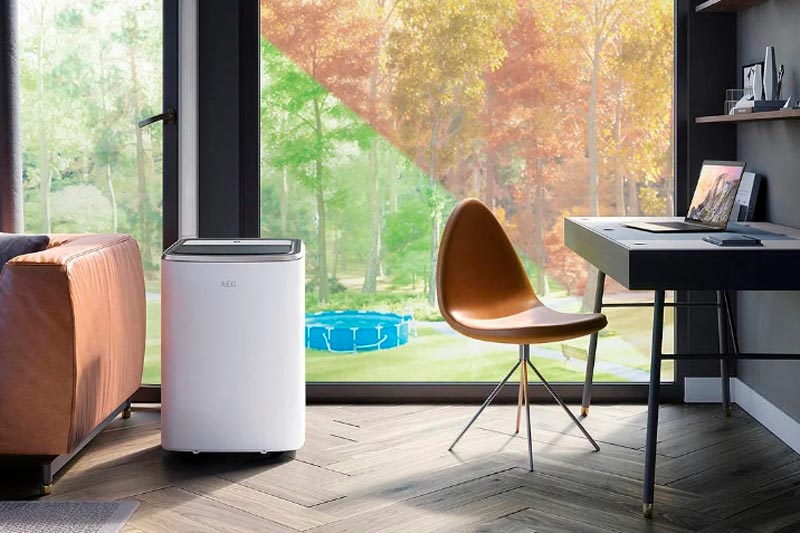
To some extent, this will depend on the size of the room and how hot the room is. Another consideration is how powerful the air conditioner is.
However, in a typical scenario, your air conditioner should drop your room temperature by about 5°F in about 20 minutes. So start it up, and let it run!
Conclusion
If you want to run your air conditioner all day, every day, that’s perfectly fine. It’s actually better for your portable air conditioner. However, if you’re operating on a tight budget, still free to run it from morning until you go to bed.
Just don’t keep turning it off throughout the day.
Letting it run all day puts less wear and tear on it and should add to its lifespan. And remember to keep up with regular maintenance, specifically:
- Draining the condensate
- Changing the filter
Finally, calculate your short and long-term costs to see what works best for your budget.
Hopefully, this information is helped you! While you’re here, why not check out the related posts below? Perhaps there’s something else we can help you with.
